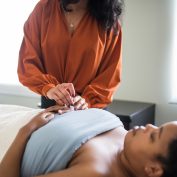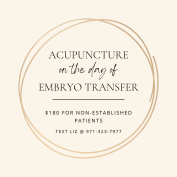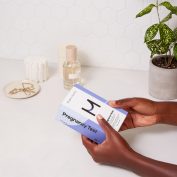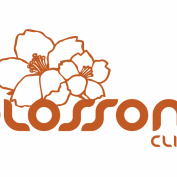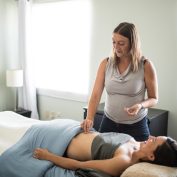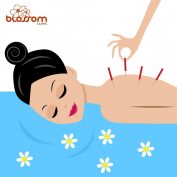Placenta Encapsulation by guest blogger Amanda Englund.
This morning I got an email from a woman who is terrified of postpartum depression. She wrote in her message that she is “willing to try anything not to experience what I did after my first baby.”
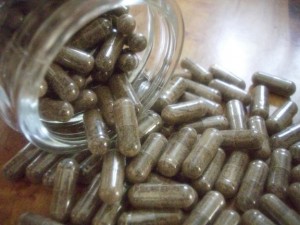
Women across America making placenta encapsulation a part of their postpartum plans for recovery. Science and society are catching up, as further research is exploring the possible benefits of placenta and celebrities like January Jones and Holly Madison are sending out Tweets about their plans to encapsulate. This seemingly unorthodox practice is gaining momentum in the natural childbirth world and as word spreads, mainstream society is taking notice as well.
This is a common theme of clients who contact me; they are boldly crossing over into the realm of what some might consider witch-doctory—at least before. These days in the Portland mama-world, placenta encapsulation is becoming more commonplace, rubbing shoulders with practices like Holistic Pelvic Care, lactation cookies, hypnobirthing and sitz baths.
In the Portland Metro Area, more and more mothers are deciding to make their placenta into pills as a way to improve their chances of having a smooth postpartum experience.
The possible benefits from this practice range from a potential increase to lactation, prevention of the baby blues, helping the uterus return to its natural size, mood balancing, energy enhancement and greater ability to bond with baby. Mothers are sharing their experiences with other moms-to-be, midwives, doulas, naturopaths and Chinese medicine practitioners alike are spreading the word that placenta pills just might be what the doctor ordered–no pun intended.
In Traditional Chinese Medicine, placenta is used as a medicinal herb, helping boost Qi, or vital life-essence, and is also tonifying and blood boosting. Placenta would also be given to postpartum women to increase lactation and alleviate symptoms of fatigue. Many naturopaths suggest placenta encapsulation to their pregnant clients, knowing that it is similar to liver, a highly nourishing food that aids the body in healing. Other cultures have used placenta to aid in postpartum healing, such as in Vietnam, Iran, Germany, Italy, Hungary, by Indigenous people in North America and Africa, to name a few. Around the globe, placenta has been used to benefit a postpartum woman in both her physical and emotional healing.
There is plenty of anecdotal testimonies and cultural evidence to support placenta ingestion as a postpartum recovery aid, but until recently there was little scientific research to support the claims that placenta encapsulation could be of benefit to postpartum women. A recent study conducted at the University of Nevada-Las Vegas analyzing the hormonal and nutritional content of fresh placenta versus encapsulated placenta (which has been steam-cooked, dehydrated and processed into a powder). The results of this study will be presented at the American Anthropological Association’s Annual Meeting in November 2013. Researchers leading this study, medical anthropologist Daniel Benyshek and graduate assistant Sharon Young, published the article “Human Maternal Placentophagy: A Survey of Self-Reported Motivations and Experiences Associated with Placenta Consumption” in the journal Ecology of Food and Nutrition in February 2013. The researchers analyzed the data collected from 189 mothers about their experiences ingesting placenta. 96% of the women expressed that they had a “positive” or “very positive” experience and 98% of women expressed interest to do it again in the future. Most of the women said they chose to ingest placenta to help with their moods and to increase lactation.
Another study of note was conducted in 1954 in Austria. Their research focused on using placenta as a lactagagon (lactation aid). The 210 women they studied were expected to have a low milk-supply and after ingesting placenta over a course of weeks, 86% had a marked increase in their supply. (Soykova-Pachnerova E, et. al.(1954). Gynaecologia 138(6):617-627.)
Many of my clients turn to placenta encapsulation because they are concerned about developing postpartum depression. Most of them have a history of PMS and know that they get cranky when their hormones are out of balance. They are hearing tales of women ingesting placenta and having easier postpartum recoveries, and they want this for themselves as well. Who can blame them? For some, postpartum recovery can be like a mine field–you never know is about to blow up in your face. Could it be hemorrhoids? Could it be infant reflux? Night sweats? Anxiety? Involuntarily peeing when you sneeze? I’m not making the claim that placenta will prevent any of these common postpartum complaints, but what it has the potential to do is help a mother’s reaction to such events feel less severe. Many of my clients report that they feel their moods are more balanced, their emotions more serene and they feel better equipped cheerfully weather the storm of postpartum recovery.
Placenta Encapsulation is the method most new parents are turning to ingest placenta. It is the most user-friendly and also allows for the mama to take her placenta pills over a longer period of time. The placenta is dehydrated, ground to a powder and then put into capsules, making it look as harmless as a vitamin. Some folks learn how to do this process through the internet, or they hire someone to perform the process for them. Most practitioners will process the placenta in the client’s home and charge a range anywhere from $100-$250 dollars. The result is about 75-200 pills, dependent of course on the size of the placenta.
Women across America making placenta encapsulation a part of their postpartum plans for recovery. Science and society are catching up, as further research is exploring the possible benefits of placenta and celebrities like January Jones and Holly Madison are sending out Tweets about their plans to encapsulate. This seemingly unorthodox practice is gaining momentum in the natural childbirth world and as word spreads, mainstream society is taking notice as well.
Amanda Englund is a Placenta Encapsulation Specialist and postpartum doula with her business Placenta Power. She lives with her husband and son in Southeast Portland, co-owns Lion Heart Kombucha and loves helping families enjoy life with a new baby.

